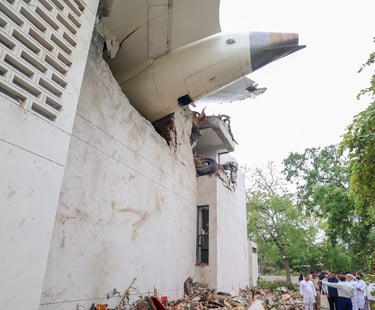Air India Plane Crash: Pilot’s Father Slams AAIB Report, Demands Independent Probe
The father of the late pilot involved in the Air India Express crash has raised serious objections to the Aircraft Accident Investigation Bureau (AAIB) report, claiming it unfairly blamed his son and tarnished his reputation. He has called for a “formal and transparent” probe to uncover the full truth behind the tragedy, reigniting debates on aviation safety and accountability in India.


By: Bharat Daily Samachar Date: 17 Sep,2025
A Family’s Fight for Justice
The aftermath of an air tragedy is never easy, not just for survivors and victims’ families, but also for those left to defend reputations. The recent Air India Express crash continues to stir emotions, and now the late pilot’s father has come forward with a passionate plea.
According to him, the AAIB’s final report “oversimplifies” the cause of the crash, pinning the majority of blame on the pilot’s actions while downplaying other critical factors such as weather conditions, air traffic control directions, and possible systemic lapses.
His statement has added a deeply human dimension to the technical and procedural conversations around aviation safety, reminding everyone that pilots too have families, dignity, and legacies to protect.
The Crash That Shook India
The Air India Express crash in question occurred under tragic circumstances when the plane overshot the runway while attempting to land in heavy rainfall. The impact caused fatalities and injuries, with both passengers and crew members deeply affected.
The AAIB conducted a detailed investigation and released a report pointing to “pilot error” as the primary cause. The conclusion, however, has not gone unchallenged. For the pilot’s family, particularly his father, this conclusion feels like an injustice.
What the Father Is Saying
The pilot’s father has openly rejected the AAIB’s findings, arguing that it unfairly singles out his son without giving enough weight to external challenges faced during the landing.
“By declaring my son guilty in such a blunt manner, the report has tarnished his reputation and ignored the larger picture. He was a skilled, dedicated professional who gave his life in the line of duty. To reduce his sacrifice to just ‘human error’ is unacceptable,” he said.
He has demanded a formal, independent probe, ideally involving international aviation experts, to re-examine the chain of events that led to the crash. His concern is not only about clearing his son’s name but also about ensuring that future investigations in India reflect transparency and fairness.
Questions Over the AAIB Report
Critics of the AAIB’s findings point out that aviation accidents are rarely caused by a single factor. Instead, they result from a combination of circumstances—weather, technical failures, communication gaps, and sometimes human judgment.
By focusing heavily on the pilot’s decisions, the AAIB, some argue, may have overlooked:
Adverse weather conditions that made landing extremely difficult.
Runway safety infrastructure, including lighting and drainage.
Air traffic control inputs and whether they created additional stress.
Aircraft maintenance records that could have influenced performance.
Such factors deserve as much scrutiny as the pilot’s actions, say aviation experts.
Aviation Safety and Accountability
This controversy opens up larger questions about aviation safety culture in India. If reports focus narrowly on blaming individuals, systemic issues may never be addressed.
For families of pilots, this creates not only grief but also frustration. Pilots are often hailed as heroes during crises but can quickly be vilified when tragedies occur. The father’s statement serves as a reminder that accountability should not come at the cost of fairness.
His demand for an independent probe highlights the need for greater transparency in accident investigations, especially when public confidence in aviation safety is at stake.
Public and Professional Reactions
Reactions to the father’s plea have been mixed. Many in the aviation community have expressed sympathy, agreeing that pilots should not be made scapegoats for complex accidents. Some industry veterans argue that India’s investigation mechanisms need reforms to reduce institutional bias and improve credibility.
At the same time, others believe that professional accountability is essential and that the AAIB was right to highlight pilot decisions. Still, even among this group, there is recognition that broader systemic issues should be equally examined.
Why This Matters Beyond One Family
This is not just about one crash, one pilot, or one grieving father. It’s about how India investigates, reports, and responds to aviation disasters. The outcome of this controversy could shape future policy, from how data is analyzed to how much weight is given to external versus human factors.
It also impacts public trust. When passengers board a plane, they do so with the belief that every aspect of safety is scrutinized. If accident reports are seen as one-sided, that confidence can be shaken.
A Call for Balanced Justice
In the end, the father’s plea is as much about his son’s honor as it is about aviation safety. He is not rejecting accountability—he is demanding balance. By calling for a formal, independent probe, he is essentially asking: “Let the truth, in all its complexity, come out.”
Whether authorities will heed his request remains to be seen. But one thing is certain—the conversation around the Air India Express crash is far from over.
Conclusion
The Air India plane crash continues to leave scars, not only in the lives of those directly affected but also in the reputation of aviation safety in India. The father of the late pilot has reignited debate by challenging the AAIB’s findings and demanding a formal, transparent investigation.
As the case gains traction, it is more than a battle for one man’s legacy—it is a test of India’s commitment to truth, fairness, and safety in the skies.
